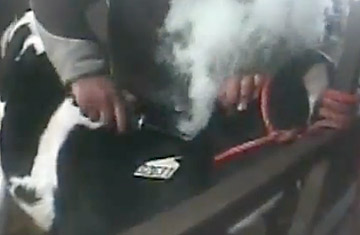
A still taken from a video released by the animal-rights group Mercy for Animals shows a calf having its horns burned off
(2 of 2)
Laws against trespassing, the bill's supporters argue, aren't sufficient. The NYFB's director of public policy, Julie Suarez, says farmland is difficult to secure and that people unfamiliar with New York's farming culture "expect farms to be open and just these nice places. But they don't realize that farms are also businesses, just like JPMorgan or wherever it is that they work." If someone wants to enter a farmer's property and take a picture, Suarez says, all he or she has to do is ask. "It is basic common courtesy to ask for permission."
Not everyone, though, is likely to be granted permission. And it is hard to see how this bill is not directed at a particular kind of visitor — one who views farms not just as businesses but as factories where the treatment of animals, not just illegal abuse, is worth documenting and showing to the public. Ritchie said in her statement that the proposal was "a starting point in the discussion of trespassing on private farms by strangers with little experience or knowledge of modern farming practices." Does that mean farmers wouldn't mind trespassers who knew a lot about such practices? Reagen, Ritchie's spokesman, told TIME, "Anyone who takes a drive through the countryside gets a chance to see how farming is done today. It's not that big a secret."
Animal-advocacy groups aren't the only ones asking why cameras on farms are a cause of concern. In a commentary published earlier this year in light of a similar bill in Florida, John Maday, managing editor of Drovers CattleNetwork ("America's Beef Business Source"), wrote that "actions such as the Florida photography bill ... only add to perceptions that producers have something to hide." He added, "We need more transparency in agricultural production."
The New York bill isn't expected to advance this term: it lacks an Assembly sponsor, and the legislative session is coming to a close. Florida and Minnesota's photo-banning bills have already failed, though Iowa's, which passed the state house, remains in question. Kansas and Montana have had bans on farm photography on the books for years.
As written, the New York bill would almost certainly be deemed unconstitutional. It makes no distinction as to where someone shoots or records from. Recording an image would be illegal even if the photographer or videographer were on the public side of a fence. The legislation's definition of farm includes "any land or property upon which farm animals are housed, cared for, grazed or bred." Those behind the bill say they don't mean to prohibit passersby from taking snapshots and wouldn't interpret it that way.
Backers also don't consider it an anti-whistle-blowing bill, though employees are among those who would be forbidden to take pictures or record audio or video. "If you witness animal cruelty, you have an obligation to report it," Reagen says, adding, "You don't need a videotape if you're a personal eyewitness to what you've seen." Supporters of the bill also say there are plenty of authorities in charge of farm oversight and, according to the NYFB, capable of enforcement. Not everyone agrees, however. There may be many regulations, but PETA, Avella and others say enforcement is sorely lacking and that undercover investigations are essential.
Cayuga County district attorney Jon Budelmann, who prosecuted Phil Niles, tells TIME that the Mercy for Animals video of the employee striking the Willet Dairy cow "was the case." Banning undercover investigations on farms strikes him as ludicrous. Without proof, he says, authorities would have just one person's word against another's. "Without the videotape, we wouldn't have had the admission," he says. It seems that down on the farm, if you see something, you have to do more than say something. You have to show something too.
